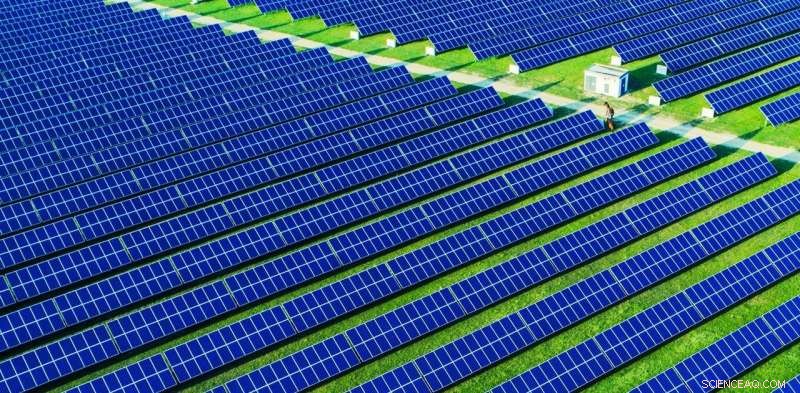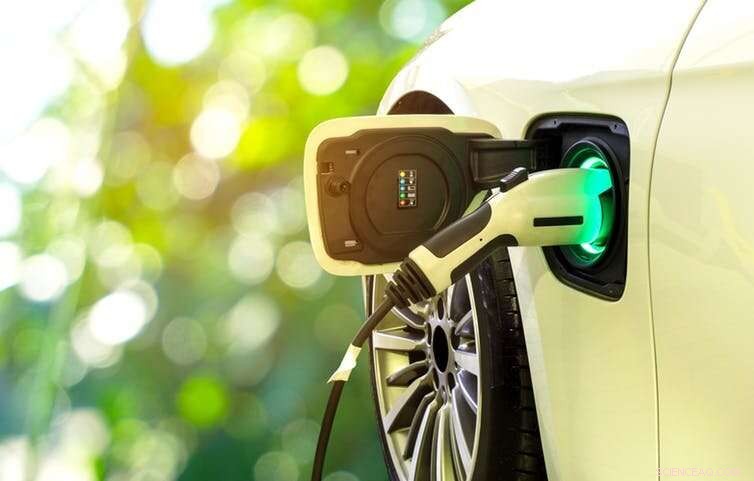
Wetenschap
Een geglobaliseerde toekomst op zonne-energie is economisch onrealistisch

Krediet:Valentin Valkov/Shutterstock.com
In de afgelopen twee eeuwen, miljoenen toegewijde mensen — revolutionairen, activisten, politici, en theoretici - zijn niet in staat geweest het rampzalige en steeds meer geglobaliseerde traject van economische polarisatie en ecologische degradatie te beteugelen. Dit komt misschien omdat we volkomen gevangen zitten in gebrekkige manieren van denken over technologie en economie - zoals het huidige discours over klimaatverandering laat zien.
De stijgende uitstoot van broeikasgassen leidt niet alleen tot klimaatverandering. Ze bezorgen ons steeds meer klimaatangst. Doomsday-scenario's halen steeds sneller de krantenkoppen. Wetenschappers van over de hele wereld vertellen ons dat de uitstoot over tien jaar de helft moet zijn van wat ze tien jaar geleden waren, of we worden geconfronteerd met een apocalyps. Schoolkinderen zoals Greta Thunberg en activistische bewegingen zoals Extinction Rebellion eisen dat we in paniek raken. En terecht. Maar wat moeten we doen om een ramp te voorkomen?
De meeste wetenschappers, politici, en bedrijfsleiders hebben de neiging hun hoop te vestigen op technologische vooruitgang. Ongeacht ideologie, er is een wijdverbreide verwachting dat nieuwe technologieën fossiele brandstoffen zullen vervangen door gebruik te maken van hernieuwbare energie zoals zonne- en windenergie. Velen vertrouwen er ook op dat er technologieën zullen zijn om koolstofdioxide uit de atmosfeer te verwijderen en om het klimaat op aarde te "geo-engineeren". De gemeenschappelijke noemer in deze visies is het geloof dat we de moderne beschaving kunnen redden als we overstappen op nieuwe technologieën. Maar "technologie" is geen toverstaf. Er is veel geld voor nodig, dat betekent claims op arbeid en middelen uit andere gebieden. We hebben de neiging om dit cruciale feit te vergeten.
Ik zou willen beweren dat de manier waarop we conventioneel geld voor alle doeleinden als vanzelfsprekend beschouwen, de belangrijkste reden is waarom we niet hebben begrepen hoe geavanceerde technologieën afhankelijk zijn van de toe-eigening van arbeid en middelen van elders. Door het mogelijk te maken om bijna alles uit te wisselen - menselijke tijd, gadgets, ecosystemen, wat dan ook - voor al het andere op de markt, mensen zijn constant op zoek naar de beste deals, wat uiteindelijk betekent dat de laagste lonen en de goedkoopste hulpbronnen in het Zuiden worden bevorderd.
Het is de logica van geld die de volkomen onhoudbare en op groei beluste mondiale samenleving heeft gecreëerd die vandaag bestaat. Om onze geglobaliseerde economie natuurlijke grenzen te laten respecteren, we moeten grenzen stellen aan wat kan worden uitgewisseld. Helaas, het lijkt steeds waarschijnlijker dat we iets zullen moeten meemaken dat dichter bij een ramp staat - zoals een semi-wereldwijde oogstmislukking - voordat we bereid zijn serieus te vragen hoe geld en markten momenteel zijn ontworpen.
Groene groei?
Neem het ultieme probleem waarmee we worden geconfronteerd:of onze moderne, globaal, en groeiende economie kan worden aangedreven door hernieuwbare energie. Onder de meeste voorvechters van duurzaamheid, zoals voorstanders van een Green New Deal, er is een onwrikbare overtuiging dat het probleem van klimaatverandering door ingenieurs kan worden opgelost.
Wat ideologische standpunten over het algemeen verdeelt, is niet het geloof in technologie als zodanig, maar welke technische oplossingen te kiezen, en of ze grote politieke veranderingen zullen vergen. Degenen die sceptisch blijven tegenover de beloften van technologie - zoals voorstanders van radicale terugschakeling of degrowth - worden vaak gemarginaliseerd door de politiek en de media. Tot dusver, elke politicus die serieus voorstander is van degrowth, heeft waarschijnlijk geen toekomst in de politiek.
Algemeen optimisme over technologie wordt vaak ecomodernisme genoemd. Het Ecomodernistisch Manifest, een beknopte verklaring van deze aanpak gepubliceerd in 2015, vraagt ons om technologische vooruitgang te omarmen, die ons "een goede, of zelfs geweldig, Antropoceen." Het stelt dat de vooruitgang van de technologie ons heeft "losgekoppeld" van de natuurlijke wereld en moet worden toegestaan om dit te blijven doen om de "rewilding" van de natuur mogelijk te maken. De groei van steden, industriële landbouw, en kernenergie, het beweert, illustreren een dergelijke ontkoppeling. Alsof deze verschijnselen geen ecologische voetafdruk hebben buiten hun eigen grenzen.
In de tussentijd, roep om een Green New Deal wordt al meer dan tien jaar geuit, maar in februari 2019 nam het de vorm aan van een resolutie aan het Amerikaanse Huis van Afgevaardigden. Centraal in haar visie staat een grootschalige verschuiving naar hernieuwbare energiebronnen en massale investeringen in nieuwe infrastructuur. Dit zou een verdere groei van de economie mogelijk maken, het wordt betoogd.
Technologie heroverwegen
De algemene consensus lijkt dus te zijn dat het probleem van klimaatverandering slechts een kwestie is van het vervangen van de ene energietechnologie door een andere. Maar een historische kijk laat zien dat het hele idee van technologie onlosmakelijk verweven is met kapitaalaccumulatie, ongelijke ruil en het idee van geld voor alle doeleinden. En als zodanig, het is niet zo eenvoudig om opnieuw te ontwerpen als we graag denken. Het verschuiven van de belangrijkste energietechnologie is niet alleen een kwestie van het vervangen van infrastructuur, het betekent ook een transformatie van de economische wereldorde.
In de 19de eeuw, de industriële revolutie gaf ons het idee dat technologische vooruitgang eenvoudig menselijk vindingrijkheid is toegepast op de natuur, en dat het niets te maken heeft met de structuur van de wereldmaatschappij. Dit is het spiegelbeeld van de illusie van de economen, dat groei niets met de natuur te maken heeft en dus geen rekening hoeft te houden met natuurlijke grenzen. In plaats van te zien dat zowel technologie als economie de kloof tussen natuur en samenleving overspannen, techniek wordt gezien als alleen met de natuur en economie als alleen met de samenleving.
De stoommachine, bijvoorbeeld, wordt eenvoudigweg beschouwd als een ingenieuze uitvinding om de chemische energie van steenkool te benutten. Ik ontken niet dat dit het geval is, maar stoomtechnologie in het vroege industriële Groot-Brittannië was ook afhankelijk van kapitaal dat op de wereldmarkten werd verzameld. De door stoom aangedreven fabrieken in Manchester zouden nooit zijn gebouwd zonder de driehoekige Atlantische slavenhandel, ruwe katoen, en katoenen textiel. Stoomtechnologie was niet alleen een kwestie van ingenieuze techniek toegepast op de natuur - zoals alle complexe technologie, het was ook cruciaal afhankelijk van mondiale ruilrelaties.
Deze afhankelijkheid van technologie van mondiale sociale relaties is niet alleen een kwestie van geld. In vrij fysieke zin, de levensvatbaarheid van de stoommachine was afhankelijk van de stromen van menselijke arbeidskracht en andere middelen die waren geïnvesteerd in katoenvezels uit South Carolina, in de VS, kolen uit Wales en ijzer uit Zweden. Moderne technologie, dan, is a product of the metabolism of world society, not simply the result of uncovering "facts" of nature.
The illusion that we have suffered from since the industrial revolution is that technological change is simply a matter of engineering knowledge, regardless of the patterns of global material flows. This is particularly problematic in that it makes us blind to how such flows tend to be highly uneven.
This is not just true of the days of the British Empire. To this day, technologically advanced areas of the world are net importers of the resources that have been used as inputs in producing their technologies and other commodities, such as land, labor, materialen, and energy. Technological progress and capital accumulation are two sides of the same coin. But the material asymmetries in world trade are invisible to mainstream economists, who focus exclusively on flows of money.
Ironically, this understanding of technology is not even recognized in Marxist theory, although it claims to be both materialist and committed to social justice. Marxist theory and politics tend toward what opponents refer to as a Promethean faith in technological progress. Its concern with justice focuses on the emancipation of the industrial worker, rather than on the global flows of resources that are embodied in the industrial machine.
This Marxist faith in the magic of technology occasionally takes extreme forms, as in the case of the biologist David Schwartzman, who does not hesitate to predict future human colonization of the galaxy and Aaron Bastani, who anticipates mining asteroids. In his remarkable book Fully Automated Luxury Communism:A Manifesto, Bastani repeats a widespread claim about the cheapness of solar power that shows how deluded most of us are by the idea of technology.
Natuur, he writes, "provides us with virtually free, limitless energy." This was a frequently voiced conviction already in 1964, when the chemist Farrington Daniels proclaimed that the "most plentiful and cheapest energy is ours for the taking." More than 50 years later, the dream persists.
The realities
Electricity globally represents about 19% of total energy use—the other major energy drains being transports and industry. in 2017, only 0.7% of global energy use derived from solar power and 1.9% from wind, while 85% relied on fossil fuels. As much as 90% of world energy use derives from fossil sources, and this share is actually increasing. So why is the long-anticipated transition to renewable energy not materializing?
One highly contested issue is the land requirements for harnessing renewable energy. Energy experts like David MacKay and Vaclav Smil have estimated that the "power density"—the watts of energy that can be harnessed per unit of land area—of renewable energy sources is so much lower than that of fossil fuels that to replace fossil with renewable energy would require vastly greater land areas for capturing energy.
In part because of this issue, visions of large-scale solar power projects have long referred to the good use to which they could put unproductive areas like the Sahara desert. But doubts about profitability have discouraged investments. A decade ago, bijvoorbeeld, there was much talk about Desertec, a €400 billion project that crumbled as the major investors pulled out, een voor een.
Today the world's largest solar energy project is Ouarzazate Solar Power Station in Morocco. It covers about 25 square kilometres and has cost around US$9 billion to build. It is designed to provide around a million people with electricity, which means that another 35 such projects—that is, US$315 billion of investments—would be required merely to cater to the population of Morocco. We tend not to see that the enormous investments of capital needed for such massive infrastructural projects represent claims on resources elsewhere—they have huge footprints beyond our field of vision.
Ook, we must consider whether solar is really carbon free. As Smil has shown for wind turbines and Storm van Leeuwen for nuclear power, the production, installation, and maintenance of any technological infrastructure remains critically dependent on fossil energy. Natuurlijk, it is easy to retort that until the transition has been made, solar panels are going to have to be produced by burning fossil fuels. But even if 100% of our electricity were renewable, it would not be able to propel global transports or cover the production of steel and cement for urban-industrial infrastructure.

Credit:Valentin Valkov/Shutterstock.com
And given the fact that the cheapening of solar panels in recent years to a significant extent is the result of shifting manufacture to Asia, we must ask ourselves whether European and American efforts to become sustainable should really be based on the global exploitation of low-wage labor, scarce resources and abused landscapes elsewhere.
Collecting carbon
Solar power is not displacing fossil energy, only adding to it. And the pace of expansion of renewable energy capacity has stalled – it was about the same in 2018 as in 2017. Meanwhile, our global combustion of fossil fuels continues to rise, as do our carbon emissions. Because this trend seems unstoppable, many hope to see extensive use of technologies for capturing and removing the carbon from the emissions of power plants and factories.
Carbon Capture and Storage (CCS) remains an essential component of the 2016 Paris Agreement on climate change. But to envisage such technologies as economically accessible at a global scale is clearly unrealistic.
To collect the atoms of carbon dispersed by the global combustion of fossil fuels would be as energy-demanding and economically unfeasible as it would be to try to collect the molecules of rubber from car tires that are continuously being dispersed in the atmosphere by road friction.
The late economist Nicholas Georgescu-Roegen used this example to show that economic processes inevitably lead to entropy—that is, an increase in physical disorder and loss of productive potential. In not grasping the implications of this fact, we continue to imagine some miraculous new technology that will reverse the Law of Entropy.
Economic "value" is a cultural idea. An implication of the Law of Entropy is that productive potential in nature—the force of energy or the quality of materials—is systematically lost as value is being produced. This perspective turns our economic worldview upside down. Value is measured in money, and money shapes the way we think about value. Economists are right in that value should be defined in terms of human preferences, rather than inputs of labor or resources, but the result is that the more value we produce, the more inexpensive labor, energy and other resources are required. To curb the relentless growth of value—at the expense of the biosphere and the global poor—we must create an economy that can restrain itself.
The evils of capitalism
Much of the discussion on climate change suggests that we are on a battlefield, confronting evil people who want to obstruct our path to an ecological civilization. But the concept of capitalism tends to mystify how we are all caught in a game defined by the logic of our own constructions—as if there was an abstract "system" and its morally despicable proponents to blame. Rather than see the very design of the money game as the real antagonist, our call to arms tends to be directed at the players who have had best luck with the dice.
I would instead argue that the ultimate obstruction is not a question of human morality but of our common faith in what Marx called "money fetishism." We collectively delegate responsibility for our future to a mindless human invention—what Karl Polanyi called all-purpose money, the peculiar idea that anything can be exchanged for anything else. The aggregate logic of this relatively recent idea is precisely what is usually called "capitalism." It defines the strategies of corporations, politicians, and citizens alike.
All want their money assets to grow. The logic of the global money game obviously does not provide enough incentives to invest in renewables. It generates greed, obscene and rizing inequalities, violence, and environmental degradation, including climate change. But mainstream economics appears to have more faith in setting this logic free than ever. Given the way the economy is now organized, it does not see an alternative to obeying the logic of the globalized market.
The only way to change the game is to redesign its most basic rules. To attribute climate change to an abstract system called capitalism—but without challenging the idea of all-purpose money—is to deny our own agency. The "system" is perpetuated every time we buy our groceries, regardless of whether we are radical activists or climate change deniers. It is difficult to identify culprits if we are all players in the same game. In agreeing to the rules, we have limited our potential collective agency. We have become the tools and servants of our own creation—all-purpose money.
Despite good intentions, it is not clear what Thunberg, Extinction Rebellion and the rest of the climate movement are demanding should be done. Like most of us, they want to stop the emissions of greenhouse gases, but seem to believe that such an energy transition is compatible with money, globalized markets, and modern civilization.

Locally produced goods. Credit:Alison Hancock/Shutterstock.com
Is our goal to overthrow "the capitalist mode of production"? If so, how do we go about doing that? Should we blame the politicians for not confronting capitalism and the inertia of all-purpose money? Or—which should follow automatically—should we blame the voters? Should we blame ourselves for not electing politicians that are sincere enough to advocate reducing our mobility and levels of consumption?
Many believe that with the right technologies we would not have to reduce our mobility or energy consumption—and that the global economy could still grow. But to me that is an illusion. It suggests that we have not yet grasped what "technology" is. Electric cars and many other "green" devices may seem reassuring but are often revealed to be insidious strategies for displacing work and environmental loads beyond our horizon—to unhealthy, low-wage labor in mines in Congo and Inner Mongolia. They look sustainable and fair to their affluent users but perpetuate a myopic worldview that goes back to the invention of the steam engine. I have called this delusion machine fetishism.
Redesigning the global money game
So the first thing we should redesign are the economic ideas that brought fossil-fueled technology into existence and continue to perpetuate it. "Capitalism" ultimately refers to the artifact or idea of all-purpose money, which most of us take for granted as being something about which we do not have a choice. But we do, and this must be recognized.
Since the 19th century, all-purpose money has obscured the unequal resource flows of colonialism by making them seem reciprocal:money has served as a veil that mystifies exploitation by representing it as fair exchange. Economists today reproduce this 19th-century mystification, using a vocabulary that has proven useless in challenging global problems of justice and sustainability. The policies designed to protect the environment and promote global justice have not curbed the insidious logic of all-purpose money—which is to increase environmental degradation as well as economic inequalities.
In order to see that all-purpose money is indeed the fundamental problem, we need to see that there are alternative ways of designing money and markets. Like the rules in a board game, they are human constructions and can, in principle, be redesigned. In order to accomplish economic "degrowth" and curb the treadmill of capital accumulation, we must transform the systemic logic of money itself.
National authorities might establish a complementary currency, alongside regular money, that is distributed as a universal basic income but that can only be used to buy goods and services that are produced within a given radius from the point of purchase. This is not "local money" in the sense of LETS or the Bristol Pound – which in effect do nothing to impede the expansion of the global market—but a genuine spanner in the wheel of globalization. With local money you can buy goods produced on the other side of the planet, as long as you buy it in a local store. What I am suggesting is special money that can only be used to buy goods produced locally.
This would help decrease demand for global transports—a major source of greenhouse gas emissions—while increasing local diversity and resilience and encouraging community integration. It would no longer make low wages and lax environmental legislation competitive advantages in world trade, as is currently the case.
Immunizing local communities and ecosystems from the logic of globalized capital flows may be the only feasible way of creating a truly "post-capitalist" society that respects planetary boundaries and does not generate deepening global injustices.
Re-localizing the bulk of the economy in this way does not mean that communities won't need electricity, bijvoorbeeld, to run hospitals, computers and households. But it would dismantle most of the global, fossil-fueled infrastructure for transporting people, groceries and other commodities around the planet.
This means decoupling human subsistence from fossil energy and re-embedding humans in their landscapes and communities. In completely changing market structures of demand, such a shift would not require anyone—corporations, politicians, or citizens—to choose between fossil and solar energy, as two comparable options with different profit margins.
To return to the example of Morocco, solar power will obviously have an important role to play in generating indispensable electricity, but to imagine that it will be able to provide anything near current levels of per capita energy use in the global North is wholly unrealistic. A transition to solar energy should not simply be about replacing fossil fuels, but about reorganizing the global economy.
Solar power will no doubt be a vital component of humanity's future, but not as long as we allow the logic of the world market to make it profitable to transport essential goods halfway around the world. The current blind faith in technology will not save us. For the planet to stand any chance, the global economy must be redesigned. The problem is more fundamental than capitalism or the emphasis on growth:it is money itself, and how money is related to technology.
Climate change and the other horrors of the Anthropocene don't just tell us to stop using fossil fuels—they tell us that globalization itself is unsustainable.
Dit artikel is opnieuw gepubliceerd vanuit The Conversation onder een Creative Commons-licentie. Lees het originele artikel. 
 Database bevat Earths 2, 000 jaar klimaatgeschiedenis
Database bevat Earths 2, 000 jaar klimaatgeschiedenis Nieuwe studie toont dominantie aan van lokale bronnen van luchtvervuiling in Delhi
Nieuwe studie toont dominantie aan van lokale bronnen van luchtvervuiling in Delhi Methaan uitgestoten door mensen enorm onderschat, onderzoekers vinden
Methaan uitgestoten door mensen enorm onderschat, onderzoekers vinden Studie van vroegere Zuid-Aziatische moessons suggereert sterkere moessonregens in de toekomst
Studie van vroegere Zuid-Aziatische moessons suggereert sterkere moessonregens in de toekomst VK moet proactiever zijn in het aanpakken van klimaatverandering
VK moet proactiever zijn in het aanpakken van klimaatverandering
Hoofdlijnen
- Hoeveel weegt het leven?
- Wat zijn enkele kenmerken van DNA?
- Hoe te differentiëren tussen mitose en cytokinese
- Creatief beheer van begrazing door het gebruik van kleine branden
- De functies van de linker temporale kwab
- De nadelen van biotechnologie
- Trucs voor het onthouden van dierenfylum
- De vogels van een meedogenloos paradijs
- Wat is het diploïde nummer?
- Vijf water XPRIZE-finalisten genoemd in zoektocht naar doorbraken in oplossingen

- Nieuw wereldrecord efficiëntie voor organische zonnepanelen

- Onderzoekers ontwerpen hoofdtelefoons die voetgangers waarschuwen voor gevaren

- Persoonlijke informatie over meer dan 3, 000 Ring-eigenaren naar verluidt gecompromitteerd

- Algoritme geeft robots instinctief inzicht in het gebruik van tools

 Meer warmte uit zonlicht halen
Meer warmte uit zonlicht halen Onderzoek naar de economische waarde van bomen, sociale en ecologische voordelen
Onderzoek naar de economische waarde van bomen, sociale en ecologische voordelen Kijken naar een medicijn in actie:precieze werking antikankermedicijnen in de cel opgehelderd
Kijken naar een medicijn in actie:precieze werking antikankermedicijnen in de cel opgehelderd Ontbossing wordt aangedreven door wereldwijde markten
Ontbossing wordt aangedreven door wereldwijde markten Machine learning-aanpak voor laaggedoseerde CT-beeldvorming levert superieure resultaten op
Machine learning-aanpak voor laaggedoseerde CT-beeldvorming levert superieure resultaten op General Electric gaat delen van overzeese verlichtingsactiviteiten verkopen
General Electric gaat delen van overzeese verlichtingsactiviteiten verkopen De intacte bossen van de aarde verdwijnen in een steeds hoger tempo:wetenschappers (update)
De intacte bossen van de aarde verdwijnen in een steeds hoger tempo:wetenschappers (update) Een economie zonder groei kan leiden tot minder crashes en hogere lonen, studie toont
Een economie zonder groei kan leiden tot minder crashes en hogere lonen, studie toont
- Elektronica
- Biologie
- Zonsverduistering
- Wiskunde
- French | Italian | Spanish | Portuguese | Swedish | German | Dutch | Danish | Norway |

-
Wetenschap © https://nl.scienceaq.com

